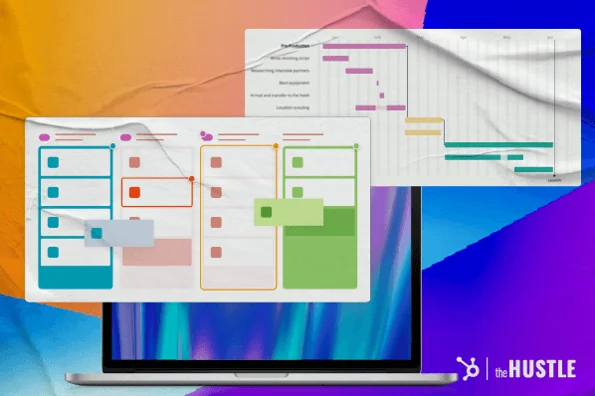An idea goes through many stages before it results in a product, but the process boils down to two main components: strategy and execution. First, you conduct research, identify a problem, and brainstorm solutions to address it.

Then, you build out your vision, trying out various designs and prototypes and iterating along the way. Mastering these two processes (product development vs. product management) helps companies create effective and profitable products.
Product Management vs. Product Development
Product management is the process of overseeing the ideation, creation, and launch of products. Product management includes a wide array of tasks, from conducting market research to building promotional strategies.
Nontechnical and technical product managers may handle different tasks, but both focus on setting the product up for success.
Unlike product management, product development builds the actual goods or services from conceptualization. The developers may code, design, and build prototypes — taking a product manager’s research and converting it into reality.
What Does a Product Developer vs. a Product Manager Do?
In general, product managers ideate and manage while product developers build, but both roles collaborate and support one another.
A product developer might let a product manager know their team cannot realistically build a certain feature. On the flip side, a product manager might provide feedback to adjust the prototype to align with their market research.
Product managers start the process with a blank slate, aiming to narrow down a problem they can solve with a viable, profitable solution. To do this, they go through a number of tasks, including:
- Identifying market gaps and opportunities
- Speaking with customers through interviews and surveys
- Conducting competitor analysis, including looking at their products, sales tactics, and more
- Developing a product vision, or the long-term objective of a product
- Aligning multiple departments on pursuing a product
After product managers zero in on a solution that other teams agree to pursue, they then develop their product strategy. This includes creating a timeline with goals through a product roadmap, brainstorming with other teams, and, eventually, collaborating with product developers.
Product developers use the research and insights gathered by product managers to build the actual goods or services. They go through multiple activities during the process, such as:
- Collaborating with different teams on finalizing design options, including A/B testing
- Building product prototypes, such as 3D-printing a model or coding a beta version
- Referencing research to ensure products match concepts and aligning the product vision with the actual product
- Creating multiple product versions to see which types resonate most with various stakeholders and early customers
Although product managers and developers take on different parts of the process, they collaborate frequently. Product managers ensure product developers understand their research, vision, and target customer.
Product developers seek approval from product managers on prototypes and feature additions. Both roles need to frequently communicate with the other — ensuring alignment on the finished product.
Developers continue to work with product managers once the product is finished. Customer feedback might result in needing a new feature or tweaking an existing one. Product managers will figure out different options and liaise with developers on building them out.
Product Developer vs. Product Manager Skills
Product developers and product managers need a similar set of soft skills to perform their jobs. They frequently brainstorm and collaborate across departments. They communicate complex ideas to people around the organization. Their roles are pivotal to the growth of their businesses.
Most product managers and developers will have the following soft skills:
- Critical thinking
- Leadership
- Communication
- Creativity
- Adaptability
- Problem-solving
However, product developers typically have more hard skills than product managers. Their jobs typically require technical expertise, including design knowledge, coding languages, and engineering.
The exact skill set depends on the industry. For example, a company that creates apps will require a product developer to know a mixture of Java, Python, and user experience (UX) best practices.
Though less technical in nature, product managers still need hard skills, such as conducting effective customer and market research. They use frameworks to distill and narrow down large pools of ideas. They’re often familiar with design and development principles.
To become a product manager, you will likely need a bachelor’s degree in business, economics, or some other relevant subject. Additionally, many aspiring product managers feature relevant side projects on their portfolio. That said, compared to other higher-paying fields, product management has fewer barriers to entry.
To enter the field of product development, on the other hand, you will need a more technical background — including a bachelor’s degree in computer science or design. While product managers may not need a full-blown portfolio, successful product developers will include designs, prototypes, and more in one.
Difference between Product Developer and Product Manager
The difference between product developers and product managers depends on the company. At some smaller firms, product developers may absorb the responsibilities of product managers. At larger businesses, multiple product developers and managers work together.
The lines between developer and manager can blur across industries, but you can differentiate between the roles based on their title and description. Product developers may go under other titles, including engineers, scientists, specialists, and more.
On the other hand, product management follows a clearer progression. Most start in entry-level roles in the field, work their way up to managers, then directors, leads, and so on. Many startups and small businesses may hire one product manager to wear multiple hats, while some big companies hire graduates as associate product managers, who can then climb the ladder.
Both roles make higher salaries than the national average of ~$54k. Product managers bring in an average salary of ~$102k, while product developers have an average salary of ~$71k. Of course, the more technical the role, the higher the pay. For example, product engineers earn ~$79k, and technical product managers make ~$117k.













